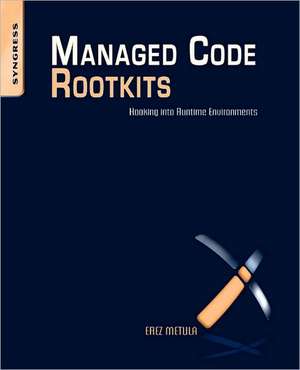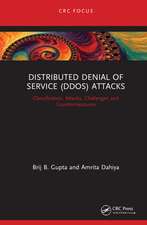Managed Code Rootkits: Hooking into Runtime Environments
Autor Erez Metulaen Limba Engleză Paperback – 25 noi 2010
The initial part of the book offers an overview of managed code rootkits. It explores environment models of managed code and the relationship of managed code to rootkits by studying how they use application VMs. It also discusses attackers of managed code rootkits and various attack scenarios. The second part of the book covers the development of managed code rootkits, starting with the tools used in producing managed code rootkits through their deployment.
The next part focuses on countermeasures that can possibly be used against managed code rootkits, including technical solutions, prevention, detection, and response tactics. The book concludes by presenting techniques that are somehow similar to managed code rootkits, which can be used in solving problems.
- Named a 2011 Best Hacking and Pen Testing Book by InfoSec Reviews
- Introduces the reader briefly to managed code environments and rootkits in general
- Completely details a new type of rootkit hiding in the application level and demonstrates how a hacker can change language runtime implementation
- Focuses on managed code including Java, .NET, Android Dalvik and reviews malware development scanarios
Preț: 225.36 lei
Preț vechi: 254.12 lei
-11% Nou
Puncte Express: 338
Preț estimativ în valută:
43.12€ • 45.03$ • 35.61£
43.12€ • 45.03$ • 35.61£
Carte tipărită la comandă
Livrare economică 08-22 aprilie
Preluare comenzi: 021 569.72.76
Specificații
ISBN-13: 9781597495745
ISBN-10: 1597495743
Pagini: 336
Ilustrații: 20 illustrations
Dimensiuni: 191 x 235 x 23 mm
Greutate: 0.68 kg
Editura: ELSEVIER SCIENCE
ISBN-10: 1597495743
Pagini: 336
Ilustrații: 20 illustrations
Dimensiuni: 191 x 235 x 23 mm
Greutate: 0.68 kg
Editura: ELSEVIER SCIENCE
Public țintă
Intermediate to advanced pen testers; hackers; malware researchers; software engineers; OS designers and developersCuprins
Part I: Overview
Chapter 1: Introduction
Chapter 2: Managed Code Rootkits
Part II: Malware Development
Chapter 3: Tools of the Trade
Chapter 4: Runtime Modification
Chapter 5: Manipulating the Runtime
Chapter 6: Extending the Language with a Malware API
Chapter 7: Automated Framework Modification
Chapter 8: Advanced Topics
Part III: Countermeasures
Chapter 9: Defending against MCRs
Part IV: Where Do We Go from Here?
Chapter 10: Other Uses of Runtime Modification
Chapter 1: Introduction
Chapter 2: Managed Code Rootkits
Part II: Malware Development
Chapter 3: Tools of the Trade
Chapter 4: Runtime Modification
Chapter 5: Manipulating the Runtime
Chapter 6: Extending the Language with a Malware API
Chapter 7: Automated Framework Modification
Chapter 8: Advanced Topics
Part III: Countermeasures
Chapter 9: Defending against MCRs
Part IV: Where Do We Go from Here?
Chapter 10: Other Uses of Runtime Modification
Recenzii
"A well-put-together work: I was able to put some of the tasks to work for me right away. An excellent resource: Technical enough to be useful, but not overly technical." -- Chris Griffin, Trainer, ISECOM USA
"As someone who has to deal with .NET security every day, I always look for new ideas and tools to make .NET applications more secure. This book provides both. It's especially valuable when you have to protect apps without having access to their original source code." -- Kyle C. Quest, GREM, GWAPT, GCIH, GCFA, GCIA, GCWN, GCUX, GCFW, GSNA, CISSP, CIPP, Director of Security Engineering, MetraTech
"Overall the book is very well structured and presented in a way that maintains the reader’s interest as the author delves ever deeper into why hackers use MCRs to target an organisation’s applications. Continuity of the content is maintained by helpful summaries at the end of each chapter… Mr Metula is a consummate and talented security practitioner who knows his subject thoroughly. I consider this book to be excellent value for money and would recommend it to any security professional. In today’s austere economic climate, modern IT solutions are being sought that are proven value for money. The use of virtual servers is rapidly increasing as they provide better utilisation and increased productivity of existing resources. This book highlights the risks of adopting such technology and provides valuable advice on countermeasures to mitigate those risks."--InfoSecReviews.com
"In today’s austere economic climate, modern IT solutions are being sought that are proven value for money. The use of virtual servers is rapidly increasing as they provide better utilisation and increased productivity of existing resources. This book highlights the risks of adopting such technology and provides valuable advice on countermeasures to mitigate those risks."--Best Hacking and Pen Testing Books in InfoSecReviews Book Awards
"As someone who has to deal with .NET security every day, I always look for new ideas and tools to make .NET applications more secure. This book provides both. It's especially valuable when you have to protect apps without having access to their original source code." -- Kyle C. Quest, GREM, GWAPT, GCIH, GCFA, GCIA, GCWN, GCUX, GCFW, GSNA, CISSP, CIPP, Director of Security Engineering, MetraTech
"Overall the book is very well structured and presented in a way that maintains the reader’s interest as the author delves ever deeper into why hackers use MCRs to target an organisation’s applications. Continuity of the content is maintained by helpful summaries at the end of each chapter… Mr Metula is a consummate and talented security practitioner who knows his subject thoroughly. I consider this book to be excellent value for money and would recommend it to any security professional. In today’s austere economic climate, modern IT solutions are being sought that are proven value for money. The use of virtual servers is rapidly increasing as they provide better utilisation and increased productivity of existing resources. This book highlights the risks of adopting such technology and provides valuable advice on countermeasures to mitigate those risks."--InfoSecReviews.com
"In today’s austere economic climate, modern IT solutions are being sought that are proven value for money. The use of virtual servers is rapidly increasing as they provide better utilisation and increased productivity of existing resources. This book highlights the risks of adopting such technology and provides valuable advice on countermeasures to mitigate those risks."--Best Hacking and Pen Testing Books in InfoSecReviews Book Awards


























